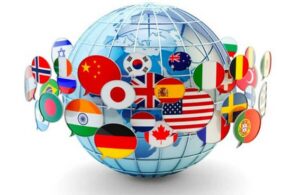Note: This blog post was originally written in Japanese for our Japanese website. We used our machine translation platform Translation Designer to translate it and post-edit the content in English. The original Japanese post can be found here.
This post is based on what one of our team members at Kawamura was thinking about language learning. He is a native English speaker working as a Japanese to English translator at our HQ in Japan. When he started thinking about trying to learn a new language, he wanted to study efficiently. So, he did a lot of research. In our past posts for this series, we discussed the concept of time, quality and disfluency in language learning. This time, we will talk about the effective use of news articles.
But before that, there's probably no doubt that pop culture such as movies and music is essential for language learning. There are phrases, lines, and even slang that you can't find in grammar textbooks, and you get to see how they are used in natural situations.
On the other hand, there are hurdles. In the case of music, there are many metaphorical expressions and abstract expressions. If the music was written a while ago, it might include slang or expressions not used anymore. Also, some of the pronunciation or inflection of words are intentionally changed to match the rhythm. In the case of movies and TV shows, there are times when the characters are talking very fast or using difficult slang and words that are rarely used in everyday life.
Then how can we more efficiently learn a language? That is with news programs. News programs are probably the best way to start learning a language. Do you wonder why? There are four main reasons we'd like to go over.

A wide range of content
The first reason is the wide range of content being broadcast. You might think news programs are more difficult compared to pop culture content such as movies and music, but they are actually not that difficult. Of course, there are news in difficult fields such as politics and science, but there are also many other news such as on animals, lifestyle, and sports.
So, you can adapt the content not only to your taste but also to your current level. Even if your vocabulary and grammatical skills are not very high, you can use it as often as you like as a learning aid without getting frustrated.
The most important information is right in front of you
Secondly, the most important information is right in front of you. Have you heard that 70% of communication is non-verbal?
In most cases, the spoken words themselves represent only as much as 10% of the information that is intended to be communicated. The remaining 90% is influenced by information other than language, such as intonation, gestures, facial expressions, and mouth movements. This was a topic researched by the behavioral psychologist Dr. Albert Mehrabian.

The same can be said for news programs. First of all, visual information is overflowing. It is not an exaggeration to say that it is the most important information. Photos and videos are displayed at the same time as the news is read, and important points are often displayed on the screen as text information. Not only that, but you also get to see the newscaster's facial expressions, gestures, and mouth movements. They are all presented in a somewhat formal way because of the nature of the content, but it's not unnatural. Your brain will automatically link what you see and hear, and it might lead to new realizations.
News programs are broadcast in the standard language of the country
The third reason is that news programs are broadcast in the standard language of the country. Japanese is used only in Japan, but English is used as a national language in many countries such as the United States, Canada, the United Kingdom, and Australia. Each country has its own dialects, accents, and specialized expressions and phrases. There are also many other countries where English is the national language.
In US English, the word "rental" is used like for a rental shop, but in British and Australian English, "hire" is used instead.
Although, there are almost no slang or abstract words, making news programs easier to understand than song lyrics or TV programs. Therefore, by watching the news programs of the country of the language you want to learn, you can practice the native language of that country.

News programs often have text information and closed captions
The fourth reason is that news programs usually have text information and closed captions. If you want to practice pronunciation or try shadowing, news programs are the best. Almost every news program has text information on the screen or has closed captions enabled.
Combining the text information or closed captions with our second and third reason, visual information and standard language, it's a perfect environment for practicing your pronunciation or trying out shadowing. Especially in the case of shadowing, normally you just imitate the sounds of an audio while reading a script, but if you use a news program, you can even imitate the movement of the mouth.
If you practice frequently like this, your pronunciation will improve dramatically without even noticing it. You will be able to speak with a familiar tone. In addition, the text information or closed captions will allow you to check the words and grammar that you didn't catch. It will help you improve your vocabulary and grammar.
Furthermore, if you can find the transcript of the news on the internet, you can download it to your computer or smartphone. You can easily add words you want to remember to your term list.
Summary
There are many other reasons why news programs are great for language learning.
One of the reasons may be that if you continue your studies based on news programs, you will build enough skills to be able to enjoy your favorite movies, music, and the country's pop culture more deeply.
Pop culture might seem more approachable, but we think news programs are actually easier to learn from. Try out using them as a starting point for language learning.
Kawamura's translation services
Kawamura International provides translation services in a wide range of fields, including IT, software localization, medical devices, pharmaceuticals, tourism, manufacturing, finance, legal affairs, SAP-related documents, and all other general business documents. We assign the most suited translator according to your industry and area of expertise.
Since our linguists are all experienced professional translators who have cleared our screening standards, you can rest assured in terms of quality.
Feel free to reach out to us if you need professional translation services or have any other questions about translation and localization services in general.
_CMYK_OL.png)

